Care Certificate Course
Quantity: 1

Duration 10-12 hours
Last audited 21st October 2025
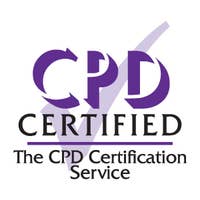

100% online training
Start when you like
Learn on any device (desktop, mobile or tablet)
Instant assessment and result
1 learner per course
Train teams of all sizes
Bulk discounts starting at 10% off 10 courses
Pay by invoice with 30 day payment terms available (5+ courses)
Includes a 10% discount for 10+ courses
This course has been updated to reflect the changes made to the Care Certificate standards in March 2025.
Individuals working in health and social care must know how to keep service users safe, meet their needs, provide person-centred care and treat everyone with compassion, dignity and respect. They must also know what to do if they feel the needs of service users are not being properly met by others.
The Care Certificate consists of an agreed set of 16 standards. These standards are a recommended tool used to support the minimum training, supervision and assessment that staff new to health and social care should receive as part of their induction. Meeting the learning outcomes of each standard ensures the basis for providing high-quality, competent care.
This online course provides the theoretical knowledge required as part of the completion of the Care Certificate and outlines the skills that must be demonstrated when being assessed. Please note that this course alone does not mean the Care Certificate has been completed, as it also requires a practical assessment in the workplace by a suitable assessor.
100% online training
Access anywhere
Same day digital Record of Achievement
Full audio voiceover
Assessment retakes at no extra cost
Learn at your own pace with no completion deadlines
Developed in partnership with a health and social care expert
Downloadable and fully editable learning portfolio
Accredited by CPD
Bulk discount for orders of 10+ courses
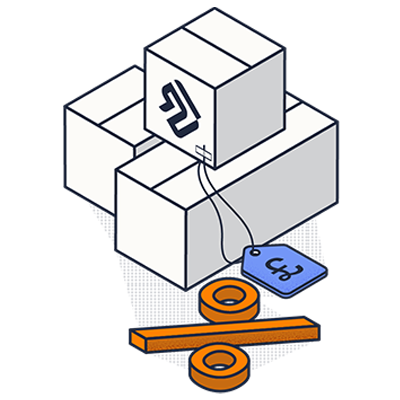
Save on our courses when you buy more training upfront. Lock in a better price now and access the training whenever you need to. You can mix and match any of our courses too and get the discount off your whole order.
10+ courses = 10% off
50+ courses = 20% off
100+ courses = 30% off
500+ courses = 40% off
Within the first module of the course, you will be able to download your learning portfolio. This is a fully editable PDF portfolio which you can download and complete on your device, or print off and fill in separately. It is made up of the 16 standards of the Care Certificate.
The portfolio encourages you to think independently, asks questions to determine your understanding of the course material and allows you to keep all of your notes in one place. It also includes sections where your assessor can write their own comments. We recommend that you complete your portfolio as you progress through your course.
Our course provides you with the theoretical knowledge required as part of the completion of the Care Certificate, and you can use your portfolio to show proof of learning and understanding to your assessor. However, the ultimate decision to assess and award the Care Certificate is the responsibility of your manager or employer, not High Speed Training.
By the end of this course, learners will:
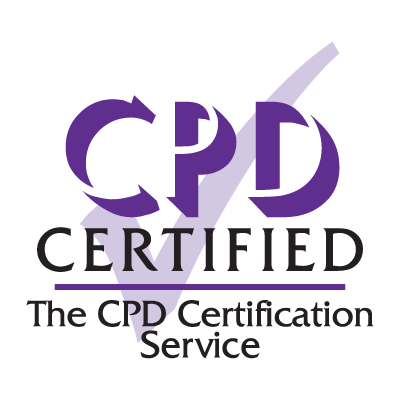
Accredited by CPD
All of our courses are accredited by the CPD Certification Service as conforming to universally accepted Continuing Professional Development (CPD) guidelines.
Our in-house Learning Designers develop all of our courses to give you and your learners the most engaging training possible.
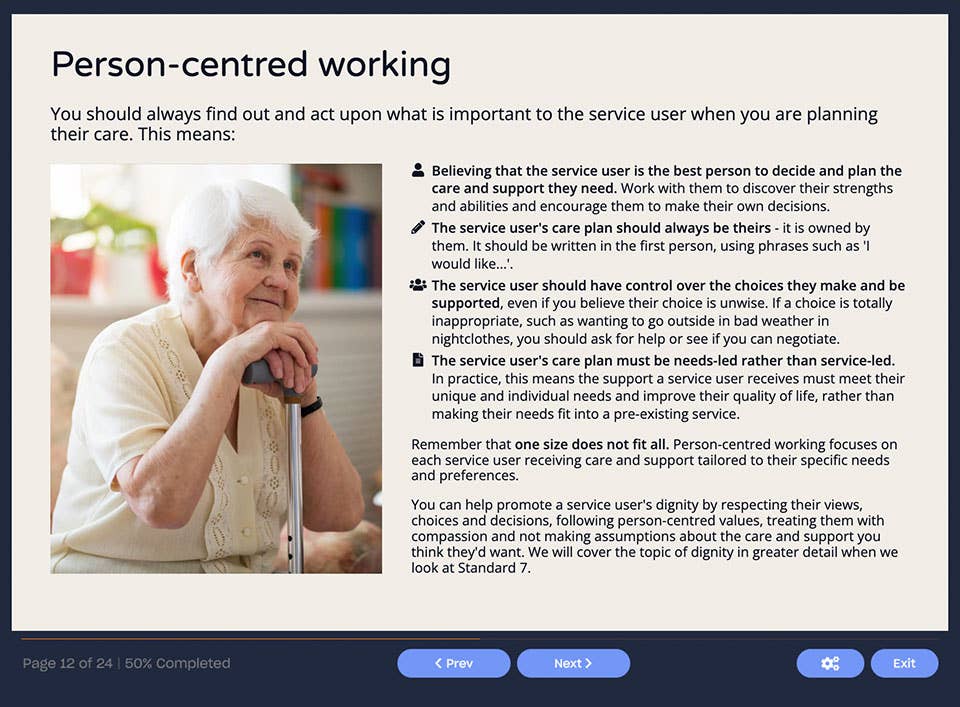
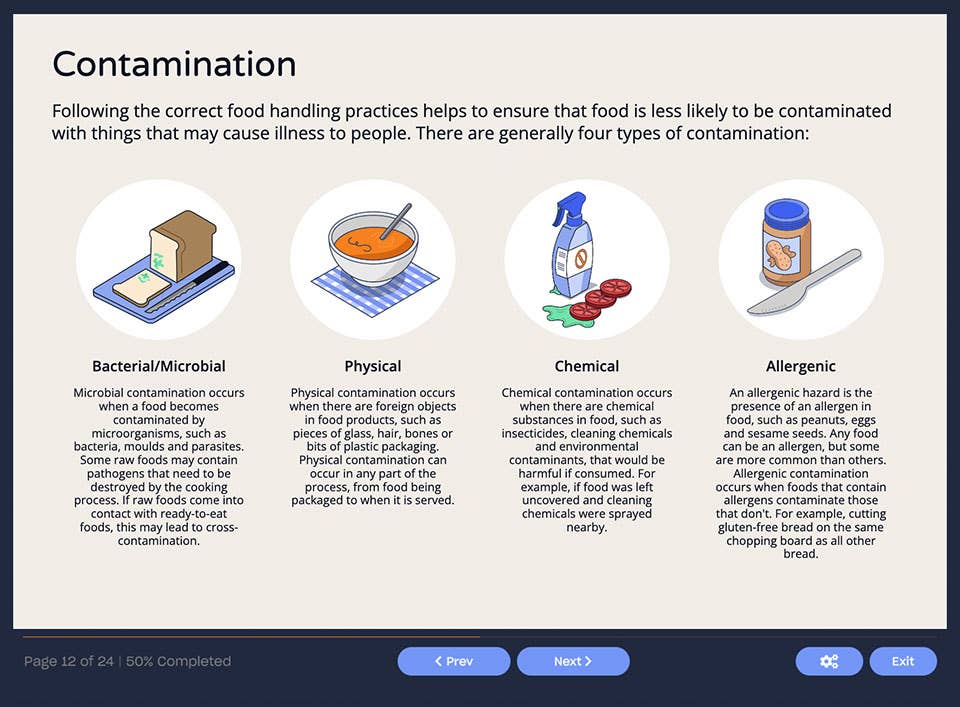
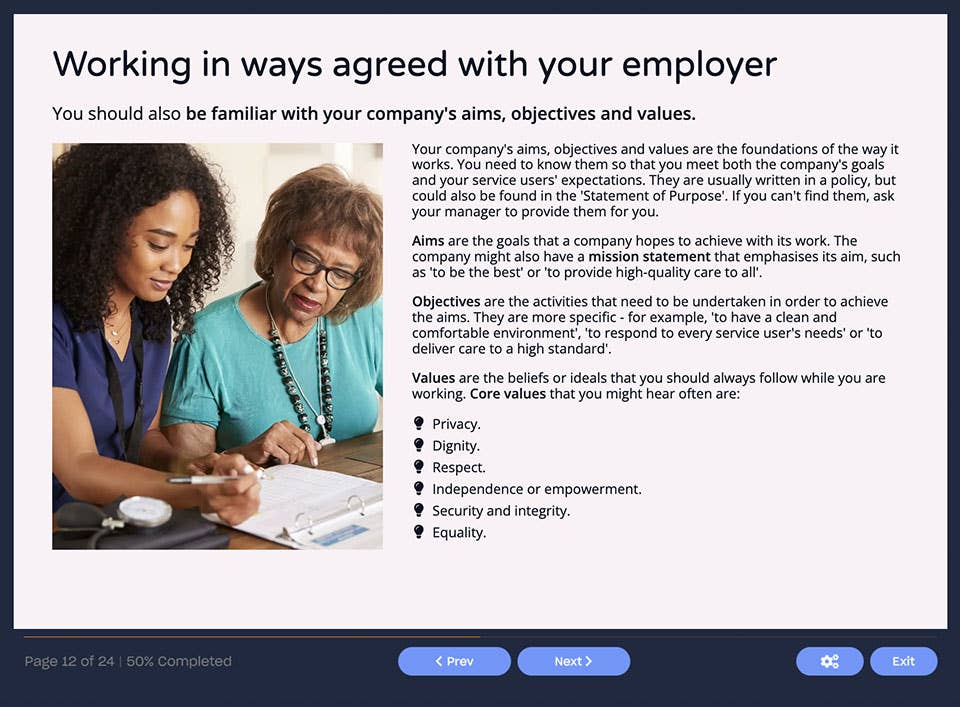
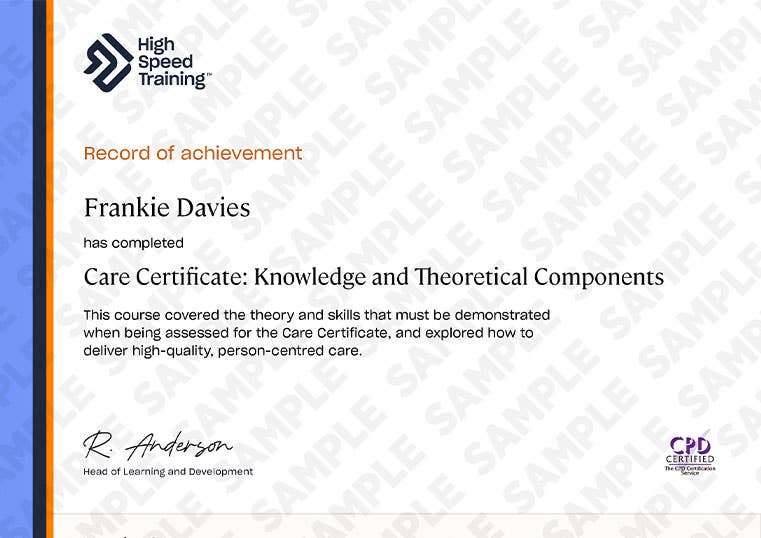




This module introduces the Care Certificate, outlining how it was founded, how it is assessed and how the health and social care sector is regulated. It also includes a link to the learning portfolio, explaining how it can be downloaded and completed throughout the training.
This module outlines the roles and responsibilities associated with jobs in health and social care, as well as the requirement to work in line with relevant codes of conduct and practice. It highlights the importance of working in agreed ways, taking accountability and being honest about making mistakes, forming positive working relationships and working in partnership with others. It also explains how to access support and identify opportunities for career development.
This module focuses on the importance of personal development in health and social care, how to create a personal development plan (PDP), where to seek support and ways to measure skills against the relevant standards. It also outlines how to reflect on personal skills and practice to identify strengths and areas for development, as well as how to respond to feedback.
This module details what is meant by ‘duty of care’ and ‘duty of candour’. It also examines how dilemmas, adverse events, errors, incidents and near misses may occur and how to respond if a mistake, conflict or complaint arises. It also explains how to support service users’ independence and decision-making.
This module explains the responsibilities of health and social care workers regarding equality, diversity, inclusion and human rights. It covers the Equality Act 2010 and the protected characteristics, the different types of discrimination, how to work in an inclusive way and what to do if discrimination is taking place within an organisation.
This module explains how to deliver person-centred care at all times, and covers the six Cs. It defines ‘mental capacity’ and outlines how to support individuals in their future wellbeing, minimise discomfort and distress and maintain their identity and self-esteem.
This module addresses the importance of communication in health and social care. It covers the ways service users might communicate, how to discover and establish their communication needs and how to reduce any barriers to communication. It also explains circumstances where confidentiality can be overridden.
This module explains the importance of privacy and dignity and how to uphold these person-centred values at all times. It outlines how to support a service user’s right to make choices and actively participate in their care.
This module explains the importance of ensuring service users receive adequate nourishment and fluids. It covers how to handle and prepare food safely, how to prevent contamination and illness and the principles of eating well. This module also includes oral health considerations.
This module provides an awareness of mental health conditions and dementia, including the signs and importance of early detection, the needs of individuals with these conditions and how to ensure that both care and support are adapted for them.
This module explores the duty to safeguard adults. It covers the ten types of abuse listed in the Care Act 2014 and how to recognise them, what to do if you suspect, or someone discloses, abuse or neglect and the role that other agencies play in safeguarding adults.
This module explores the duty to safeguard children. It covers the types of abuse children may be exposed to and how to react if abuse is suspected, found to be taking place or directly disclosed.
This module provides an awareness of basic life support and explains practical, competency-based training that meets the UK Resuscitation Council guidelines. It explains the primary survey, how to help adults, children and infants who are choking, the recovery position, CPR and how to use an automated external defibrillator (AED).
This module looks at the various elements of health and safety relevant to jobs in health and social care. It covers key elements such as risk assessment, fire safety, procedures relating to medication and hazardous substances and moving and assisting people and objects. It also explains security considerations and how to manage mental health and personal wellbeing.
This module explains the importance of safeguarding service users’ and colleagues’ personal information. It outlines the different types of data, handling information and record-keeping. It also looks at data breaches and risks to data security.
This module explains the causes of infection, including the six links in the chain of infection. It outlines how to maintain personal hygiene, use PPE correctly and clean and decontaminate the care environment and equipment.
This module provides an overview of different types of disabilities. It also describes autism and explains how to adjust communication and care delivery to promote the wellbeing of service users at all times. It also covers discriminatory and unlawful behaviours towards people with disabilities.
An online assessment is taken upon completion of the training material. You will be asked 30 multiple-choice questions with a pass mark of 80%. The answers are marked automatically, so you will instantly know whether you have passed. If you don’t pass, don’t worry! You can take the test as many times as you need with no extra charge.
This course is suitable for anybody who requires theoretical knowledge to support the practical element of the Care Certificate. The course explains how they will be assessed, what they must be able to demonstrate and the skills required to fulfil their role.
Completion of the Care Certificate is recommended as part of the induction process for staff new to certain roles in the care industry, and is a key expectation of the Care Quality Commission (CQC) in England. While there is no statutory requirement to implement the Care Certificate framework, the CQC recognises it as a best practice tool that can be used as a minimum standard of training, in addition to any specific training required, to ensure that health and social care workers provide high-quality, person-centred care.
This course is not suitable for regulated staff, including doctors, social workers and occupational therapists. They are not required to complete the Care Certificate as they will achieve similar skills and knowledge as part of their professional training.

In partnership with
Fiona Smith
Principal Trainer
Fiona Smith is the Principal Trainer at Chrysalis Training and Consultancy, providing support and training to help providers achieve and maintain CQC compliance.
With over 25 years of experience in health and social care, Fiona holds a live Learning Disability Nursing PIN with the Nursing and Midwifery Council and has extensive experience in service leadership, workforce development, and quality assurance.
Since 2005, Fiona has developed and delivered a wide range of training programmes, including NVQ assessments and The Care Certificate. Fiona was a CQC Registered Homecare Manager that achieved outstanding rated services and won Regional Home Care Manager of the Year 2020 at the Great British Care Awards.
A step-by-step guide to using our Care Certificate online course.
Try a free demo of our course to sample the course content and training method to ensure it meets your needs.
If you decide to take our course, you can easily purchase online or contact our friendly Sales team.
Allocate the training to your learners via our simple-to-use learning management system (LMS). Learners will then receive an email containing details of how to start their training.
Learners log in to our LMS and begin the online course, where they will be asked to download a Learning Portfolio.
This portfolio consolidates theoretical knowledge components of the 16 Care Certificate workbooks into one convenient learning portfolio, which can be completed by the learner as they progress through the online course.
Once a learner has passed the Care Certificate online course and completed their learning portfolio, they can share the portfolio with their manager/employer, who will assess the learner's knowledge and provide appropriate guidance.
Learners will receive a digital Record of Achievement, which can be downloaded and kept as recognition of successfully completing our online course.
The decision to assess and award the Care Certificate is the responsibility of managers and/or employers, not High Speed Training.
Our Care Certificate online course provides learners with the knowledge component of the Care Certificate. Managers and/or employers must arrange for a suitable practical assessment to be made in the workplace.
Once the knowledge and practical elements have been successfully completed, managers and/or employers can decide to award the Care Certificate.
A free trial that includes the first few modules of our Care Certificate course is available.
The free trial allows you to sample the course content and our training delivery method to ensure it meets your needs. If you decide to take our Care Certificate course there is a charge of £20 +VAT per learner.
The knowledge, learning and understanding gained from the Care Certificate training can be used as recognition of prior learning and can be mapped and linked to Regulated Qualification Framework (RQF) units from:
Additionally, the learning portfolio within the course is yours to complete and keep and can be used to demonstrate evidence of your prior training, skills and knowledge in future.
Yes. Both the online training course and the learning portfolio are compatible with most desktop, tablet and mobile devices with an appropriate PDF Reader installed (like Adobe).
However, we recommend using a desktop/laptop computer for the best experience.
No. You can access our training at any time and you're able to start and stop the course as many times as you like.
Also if you don't successfully pass our online knowledge assessment the first time, you can revisit the training material and retake the online knowledge assessment at no extra cost.
The decision to assess and award the Care Certificate is the responsibility of your manager and/or employer, not High Speed Training.
Our Care Certificate online course provides you with the knowledge component of the Care Certificate. Your manager and/or employer must arrange for a suitable practical assessment to be made in your workplace setting.
Once the knowledge and practical elements have been successfully completed your manager and/or employer can decide to award the Care Certificate.
Yes. The learning portfolio is an editable PDF file. To open any PDF file, a PDF reader, such as Adobe Acrobat Reader, is needed. Most devices already have a PDF reader installed on them by default. To check if you can correctly access and use our Learning Portfolio please try this sample learning portfolio.
All of our training is done within your web browser - there are no apps to download or software to install.
After picking the courses you need and completing your purchase, you will receive a confirmation email. To access our courses yourself or to distribute them to others you just need to click the ‘Get Started’ button within the email and select which option you want. You will then be able to add the course(s) into an existing account, or create a new account.
Of course just add the amount of courses you need and follow the purchase process. Please do be aware that it is one course per learner so they will all need their own course.
When buying courses for a team you'll also get access to our Management Suite free of charge. This is a tool that will allow you to allocate, track and review the training of your team.
Did you know? - We offer free training sessions on how to get the most from your Management Suite. To benefit from this, please contact: managersupport@highspeedtraining.co.uk to get your session booked in.
Yes, our bulk discounts are automatically applied to orders containing any combination of courses. We offer the following discounts on bulk purchases:
If you purchase 10+ courses you receive a 10% discount
If you purchase 50+ courses you receive a 20% discount
If you purchase 100+ courses you receive a 30% discount
If you purchase 500+ courses you receive a 40% discount
You can pay for our training using either a Debit or Credit card.
For companies ordering 5 or more courses, you’ll also be given the option to pay by invoice. If you would like to pay by invoice for fewer than 5 courses then please contact our Sales Team by calling 0333 006 7000 or emailing us at sales@highspeedtraining.co.uk.
Yes. You can use your username and password to log in and revisit the training material as many times as you like, even after completing the course.
No, we want our courses to work around you so there’s no time limit in which you must complete the training after making a purchase. You can also split your training over as many different sessions as you wish, as course progress is saved as you make your way through the training. You’re free to learn entirely at your own pace.